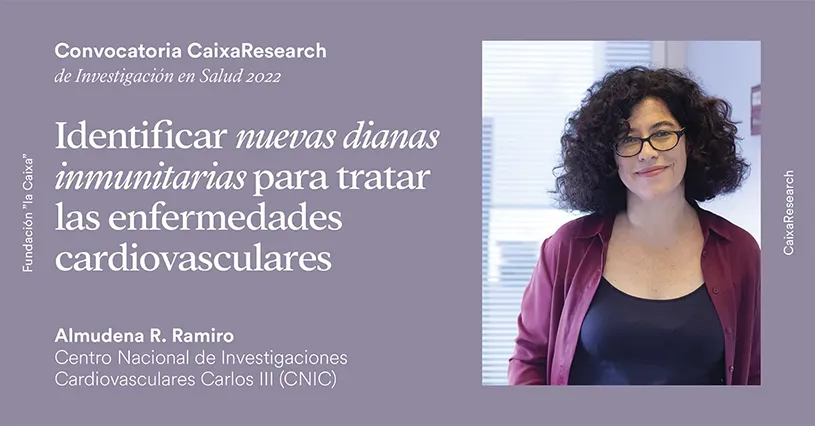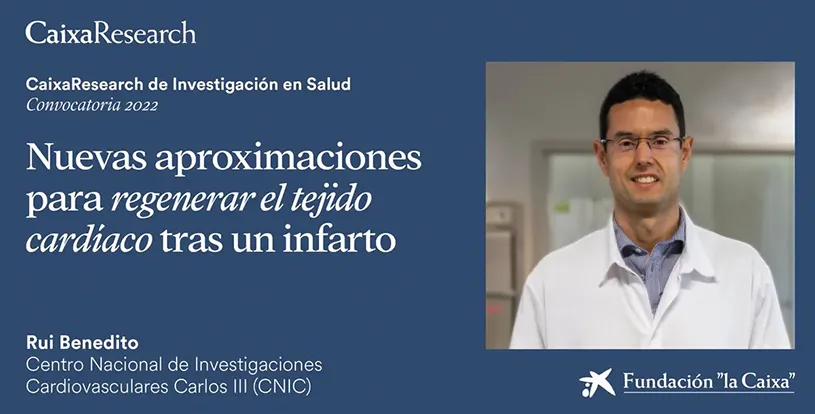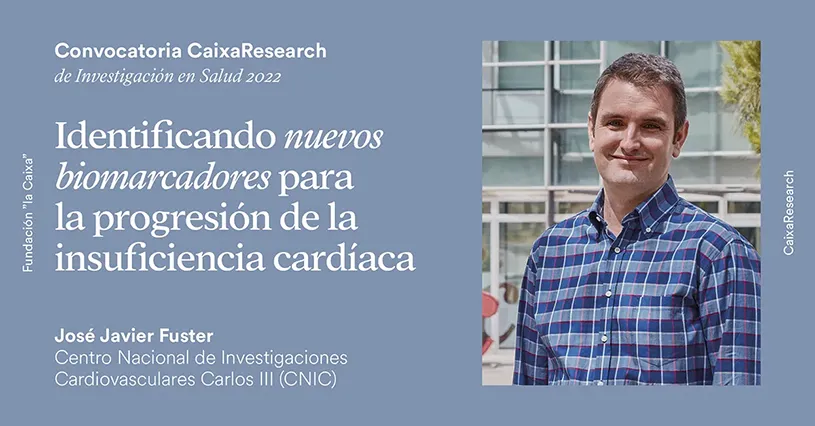Four clinic projects selected "Health Research Projects 2022" by Fundación "la Caixa"
Four CNIC (Centro Nacional de Investigaciones Cardio-vasculares) projects have been selected by “La Caixa” Foundation in the 2022 edition of its Health Research Projects.
The selected projects were:
- “Identifying new immune targets to treat cardiovascular disease,” whose principal investigator is Dr. Almudena R. Ramiro.
- “New approaches to heart tissue regeneration after a heart attack,” led by Dr. Rui Benedito.
- “Identifying new biomarkers for the progression of heart failure,” whose principal investigator is Dr. José Javier Fuster.
The fourth project is “Prompt diagnosis of coronary heart disease to prevent early mortality,” a consortium project whose principal investigator is Teresa Correia of the Centro de Ciências do Mar do Algarve (CCMAR) (Portugal), in which CNIC’s Dr. Borja Ibáñez Cabeza participates.
IDENTIFYING NEW IMMUNE TARGETS TO TREAT CARDIOVASCULAR DISEASES

Principal investigator: Almudena R. Ramiro. B cell Biology Lab
Funding: 750.042,40 €
Consortium project with: Dr. José Luis Martín Ventura, of the Fundación Jiménez Díaz’s Instituto de Investigación Sanitaria
Cardiovascular diseases are the main cause of death in the world, and the WHO estimates that they cause the death of 17.9 million people each year. These deaths mainly originate in atherosclerosis and abdominal aortic aneurysms, the two most common diseases affecting arterial vessels. The immune system plays a key role in both diseases. This is because they are associated with a chronic inflammatory immune response involving both innate and adaptive immunity. Due to this key role in causing the diseases, the immune system is an interesting target for the development of early diagnostic tools and new treatments. However, to date, this approach has faced a hurdle: limited knowledge about which antigens trigger immune response.
This team has already described one antigen of atherosclerosis, and this project will identify new immune targets for both atherosclerosis and abdominal aortic aneurysm. The investigations will pave the way for implementation of new strategies that restrict or boost a specific immune response.
NEW APPROACHES TO HEART TISSUE REGENERATION AFTER A HEART ATTACK

Principal investigator: Rui Benedito. Molecular Genetics of Angiogenesis
Funding: 999.948,04 €
Consortium project with: Mariona Graupera, of the Fundació Institut de Recerca contra la Leucèmia Josep Carreras; Holger Heyn, of the Centro de Regulación Genómica (CRG); and Rafael Kramann, of University Hospital RWTH Aachen (Germany)
Myocardial infarction is the leading cause of death in developed countries and the third cause of death in developing countries. Most heart attacks are caused either by myocardial ischaemia or coronary artery occlusion. Seven of every ten people who suffer a heart attack survive.
In common with current therapies, heart tissue has little regenerative capacity, which leads to high morbidity and an associated cost in healthcare. To a large extent, the low regenerative capacity of cardiac tissue is related with the restricted activity of vascular cells in the area of the infarction. This means that an insufficient amount of blood reaches this area and limits the capacity to heal and regenerate.
The group will endeavour to characterise and identify genetic pathways and pharmacological compounds that might activate vascular cells in the infarct area, so that their growth is effectively promoted, stimulating the regenerative capacity of the tissue, which could open the door to discovering new strategies to prevent heart failure.
IDENTIFYING NEW BIOMARKERS FOR THE PROGRESSION OF HEART FAILURE

Principal investigator: José Javier Fuster. Hematovascular Pathophysiology
Funding: 998.043,28 €
Consortium project with: Núria López-Bigas, ICREA- Institut de Recerca Biomèdica (IRB Barcelona); Antoni Bayés Genís, of the Fundació Institut d’Investigació en Ciències de la Salut Germans Trias i Pujol (IGTP); Domingo Andrés Pascual Figal, of the Fundación para la Formación e Investigación Sanitarias de la Región de Murcia; and Manel Esteller Badosa, of the Fundació Institut de Recerca contra la Leucèmia Josep Carreras (Institut Josep Carreras)
Until recently, the acquisition of mutations in blood-forming stem cells was only considered of interest for cancer. Nevertheless, there is an increasing body of evidence to suggest that it is also a distinctive marker of ageing. In fact, several studies on humans have shown that people who have certain mutations in their blood cells, a phenomenon called clonal haematopoiesis, present high mortality rates, essentially due to cardiovascular disease.
A relationship exists between these mutations and the development of heart failure, a disease in which the heart does not pump blood efficiently.
The MyoClonal collaborative project will combine studies in humans and mice with the aim of better understanding the importance of clonal haematopoiesis in cardiovascular disease. The researchers will undertake an in-depth study of the effects of different acquired mutations in blood cells on heart failure. The knowledge generated will enable better treatment for heart failure patients, who usually require frequent hospital admissions and present a high risk of death.
PROMPT DIAGNOSIS OF CORONARY HEART DISEASE TO PREVENT EARLY MORTALITY
Principal investigator: Teresa Correia, of the Centro de Ciências do Mar do Algarve (CCMAR) (Portugal)
Consortium project with: Borja Ibáñez Cabeza. Translational Laboratory for Cardiovascular Imaging and Therapy
Coronary heart disease (CHD), the leading cause of death worldwide, occurs when the flow of blood to the heart becomes restricted. Early detection of this disease is of vital importance to prevent potentially life-threatening events.
Currently, the most frequently used method for early detection of CHD is coronary angiography. This test provides images of blood flow through the coronary arteries to the heart. The drawback is that this invasive procedure requires hospital admission and exposes the patient to radiation. So, in addition to the expense, it is impractical for routine screening.
There is an alternative to angiography: cardiac magnetic resonance imaging perfusion (CMRI perfusion). Unlike angiography, it is a safe, non-invasive procedure. However, it has two drawbacks: the low quality of the image and incomplete coverage of the heart. On the other hand, interpreting the data is complex and requires highly trained staff. These factors have hampered the widespread adoption of CMRI perfusion.
To overcome these problems, the researchers in this project will combine mathematical models of cardiac blood flow, CMRI perfusion and reconstruction of images to obtain unprecedented data about the health of the heart.
The project outcomes will contribute to improving the diagnosis and treatment of CHD and eventually enable an increase in survival rates, quality of life and patient safety.
















